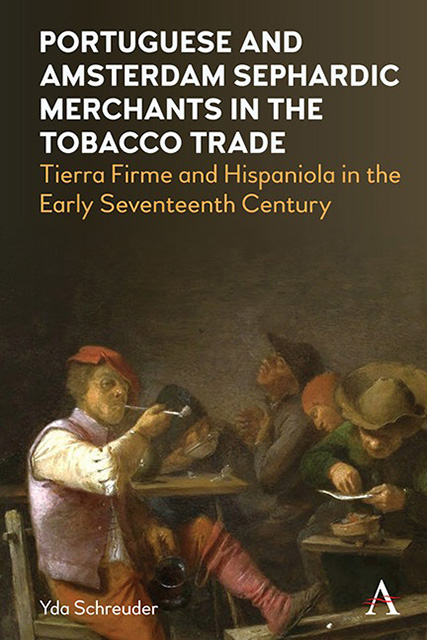 Portuguese and Amsterdam Sephardic Merchants in the Tobacco Trade
Portuguese and Amsterdam Sephardic Merchants in the Tobacco Trade Published online by Cambridge University Press: 17 October 2023
Introduction
According to Simon Schama in The Embarrassment of Riches (1987): “… The smell of the Dutch Republic was the smell of tobacco.” Describing the Dutch Golden Age, he referred to accounts by visitors to the Netherlands who were struck by the omnipresence of tobacco smoke in inns and towing barges and the common sight of men and women smoking in public. I am not sure if this was a general situation at the time, but it was certainly true that in depictions of hearth and home in Dutch paintings of the seventeenth century, tobacco pipes and smoking were prominent features. Tobacco consumption in Europe in the seventeenth century experienced a remarkable growth and provided substantial profits for merchants engaged in the tobacco trade. Yet, we know very little about its very beginnings and, in fact, you could say that compared to the sugar trade, the tobacco trade is terra incognita. In part, this is because the tobacco trade was contraband trade in the early seventeenth century when Portuguese and Sephardic merchants became engaged in exchange with the coastal regions of South America and the Caribbean islands under Spanish and Portuguese rule where Dutch merchants including Amsterdam’s Sephardic merchants were considered “interlopers”; foreign merchants with no license to trade. Furthermore, they were considered enemy merchants as the Dutch Republic was at war with Habsburg Spain during the Eighty Years’ War (1568–1648). Whereas we know the broad outline of various aspects of the tobacco contraband trade in the later part of the seventeenth century, we know very little about why and when Amsterdam became the European—or you might say—the global marketplace for tobacco or where tobacco was first traded for profit. Here, we need to delve into the history of Amsterdam as a staple market and the role Portuguese and Sephardic merchants played in the Spanish and Portuguese colonial trade. In the sixteenth century, Antwerp in Flanders (the Southern Netherlands) had been the main market place for colonial goods exchanged in Northwestern Europe, but toward the end of the century, Amsterdam replaced Antwerp in that role.
To save this book to your Kindle, first ensure [email protected] is added to your Approved Personal Document E-mail List under your Personal Document Settings on the Manage Your Content and Devices page of your Amazon account. Then enter the ‘name’ part of your Kindle email address below. Find out more about saving to your Kindle.
Note you can select to save to either the @free.kindle.com or @kindle.com variations. ‘@free.kindle.com’ emails are free but can only be saved to your device when it is connected to wi-fi. ‘@kindle.com’ emails can be delivered even when you are not connected to wi-fi, but note that service fees apply.
Find out more about the Kindle Personal Document Service.
To save content items to your account, please confirm that you agree to abide by our usage policies. If this is the first time you use this feature, you will be asked to authorise Cambridge Core to connect with your account. Find out more about saving content to Dropbox.
To save content items to your account, please confirm that you agree to abide by our usage policies. If this is the first time you use this feature, you will be asked to authorise Cambridge Core to connect with your account. Find out more about saving content to Google Drive.